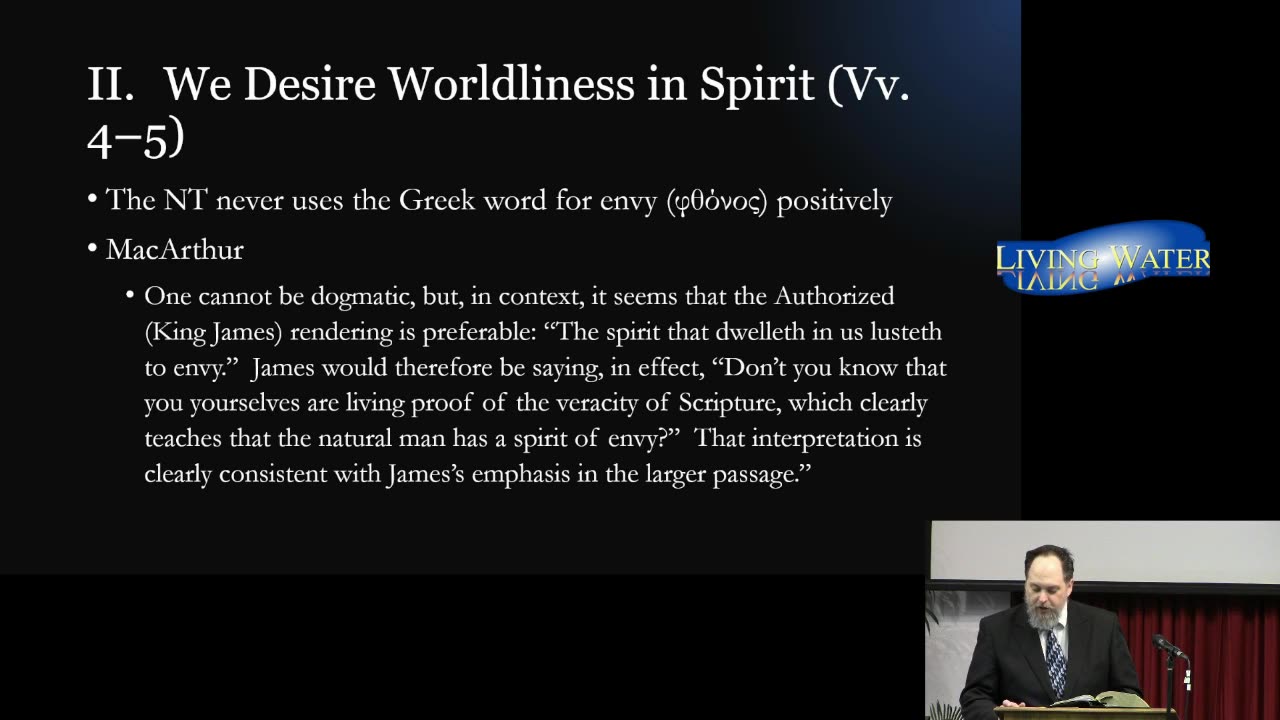Premium Only Content

“Love for the World and for Grace” (James 4:4–6)
“Love for the World and for Grace” (James 4:4–6)
Christians, we can have an adulterous problem of the heart. But, there’s good news, if we’ll have it! This evening, we'll consider the contrary pull of the world and grace in our hearts.
-Notes: https://pastormarksbury.blogspot.com/2025/02/sermon-love-for-world-and-for-grace.html
-Livestream: https://lwbcfruita.org/live
-Donations: https://www.lwbcfruita.org/give
Manuscript:
“Love for the World and for Grace” (James 4:4–6)
Series: “James: True Faith Works” #18
Text: James 4:4–6
By: Shaun Marksbury
Date: February 23, 2025
Venue: Living Water Baptist Church
Occasion: PM Service
I. Introduction
The prophet Hosea received one of the most heartbreaking callings in Scripture. God commanded him to marry Gomer, a woman who proved unfaithful to him. Time and again, she abandoned him, running after other lovers, yet God told Hosea to take her back.
This was a vivid illustration of Israel’s spiritual adultery. Through their painful marriage, God shows His people that pursuit of the world is no different than a wife betraying her faithful husband. They claimed to belong to the Lord, but they gave their hearts to idols and worldly desires.
James picks up this same imagery in our passage today. He even calls his readers adulteresses because their divided hearts betray their love for God. The good news, however, is that just as God pursued wayward Israel and as Hosea pursued Gomer, He gives greater grace to those who turn back to Him in humility.
Even as Christians, we can have an adulterous problem of the heart. But, there’s good news, if we’ll have it. In this passage, we’ll note that we desire worldliness in spirit (vv. 4–5), but we receive grace through humility (v. 6). Let’s consider the first point.
II. We Desire Worldliness in Spirit (vv. 4–5)
You adulteresses, do you not know that friendship with the world is hostility toward God? Therefore whoever wishes to be a friend of the world makes himself an enemy of God. Or do you think that the Scripture speaks to no purpose: “He jealously desires the Spirit which He has made to dwell in us”?
James just talked about how there are wars and fights within the Christian community, challenging them to see that the problem is inside them. His language grows harsher here, as he calls them adulteresses. He will show them definitively that they have created their own issue.
Now, the Greek manuscript underlying the King James added words and made this more inclusive, so the KJV reads, “Ye adulterers and adulteresses.” Yet, it appears James only used the feminine form, perhaps to give added sting to this condemnation. That’s why most of your versions only say “adulteresses.”
It’s a strong term, and the question is whether he is calling them adulteresses in the literal or the figurative sense. It is possible, of course, that there were sexually immoral people among these professed believers. Paul applies the term “adulteress” to a woman who joins to another man while her husband lives (Rom. 7:3), and he had to deal with immorality among believers (cf. Eph. 5:3–5). Yet, the context here doesn’t seem to indicate that James is condemning them all as adulterous people.
These Jewish converts may have already had a strong sense of sexual fidelity, but it seems many lacked a deeper sense of spiritual fidelity. Often, Scripture applies the term adultery to spiritual unfaithfulness (cf. Ezek. 16:32). These Jewish believers would have been familiar with the language of harlotry being applied to Israel. James brings that concept from the Old Testament and applies it to them.
Why? These were the people we considered last time who were having fights because of what they wanted first, and they were not seeking God in prayer. Those who did resort to prayer did so without care about what God willed; they only wanted fulfilled desires. As such, James says here that they are proud, and calls them to submit to God in v. 7 and humble themselves before Him in v. 10. After all, they’ve been speaking against one another and, as we’ll see in vv. 13–17, they don’t make plans considering God’s will at all.
They do all of this because they seek friendship with the world. The term here is philia (as in Philadelphia, “brotherly love”). They were forming bonds with the world that we might translate friendship, going past surface-level likes and dislikes to “deep and intimate longing.”[1]
James warns that such a position is hostility or “enmity” (LSB) with God. It is as though Christians were gearing up with unbelievers to battle the Almighty! This hostility exists because worldliness is a love of the flesh (Rom 8:7), indicating that the love of God isn’t present (1 John 2:15). Christians never consider this as they slip into worldliness, but it is absolutely the case.
So, we read a “therefore” here — “Therefore whoever wishes to be a friend of the world makes himself an enemy of God.” Understand, this is not an accidental relationship; the language indicates a will or purpose.[2] The truth is that we can’t serve two masters (Matt 6:24). Christ said the world will hate His disciples (John 15:19), and we should expect no less. Paul also describes the course of this world as following “the prince of the power of the air” (i.e., the devil), “the spirit that is now working in the sons of disobedience” (Eph. 2:2). To become a friend of the world, then, we set ourselves up as enemies of God and His ways, wittingly or unwittingly.
That brings us to an explanation in v. 5. James starts with another question. This is rhetorical, expecting a negative answer; the Scripture does not speak with no purpose. To put this positively, Scripture speaks with purpose.
Yet, this verse of Scripture is very difficult to interpret! For instance, James seems to be quoting a verse of Scripture, but it does not seem to be a direct citation. Some have suggested near matches, such as Psalm 42:1 — “As the deer pants for the water brooks, so my soul pants for You, O God.” However, that isn’t quite what James says here, and it doesn’t seem to match the context, either.
It’s helpful to step back and remember that we don’t always cite verses word-for-word, and neither do the biblical writers. James’s concept is certainly in Scripture, but it appears to be more of a summation of biblical thoughts on a subject. Now, it sometimes bothers Christians when we try to systematize doctrine from various places in the Bible, but it shouldn’t. This verse gives us justification for saying “Scripture says” when summarizing a biblical truth.
Yet, because there’s debate about what this verse means, there’s also debate as to the biblical truth James is presenting us. So, we need to consider the text before us and see if we can come up with a meaning that matches what the rest of Scripture says. Particularly, we need to focus on the identity of “the spirit” and the desire of this verse. Translations differ as to whether it should be capitalized or lowercase (keep in mind that such capitalization rules were absent from the original languages). Because of how word-order works in Greek, there’s also a debate as to whether the “spirit” here is the object of the yearning or the one who has a jealous desire. Such a discuss requires us to get into the weeds a bit, but this exercise is a good way for you to see how pastors and Bible teachers work through difficult verses. It’s also worth considering the various views because they do have parallel Bible truths for us to consider in our sanctification; none are necessarily heretical or heterodox.
The first major view is that James is referring to God’s jealousy for His people. The Old Testament describes God as a jealous God (Exod. 20:5; 34:14; Deut. 4:24), and that is an interpretation consistent with the surrounding context. After all, James rebukes his audience for spiritual adultery. If this interpretation is correct, then the verse highlights God’s desire for the full devotion of His people, reinforcing the incompatibility of friendship with the world and loyalty to God. However, while the concept of God’s jealousy is clearly biblical, the specific wording of this verse hints to another meaning.
So, the second view takes the spirit in this verse as a reference to the Holy Spirit. This is why many translations, including this one, capitalize “Spirit” here. Of course, the Bible speaks of the Spirit dwelling within believers (1 Cor. 6:19; 2 Cor. 6:16), and this would fit well with James’s broader call to holiness.
Yet, this reading presents several challenges. This would be the only direct reference to the Holy Spirit in James, which lacks any broader exposition on the Spirit’s work. Second, the phrase “yearns jealously” is simply an unusual way of describing God the Father’s relationship with the Holy Spirit within us, and it would be equally unusual to make the Spirit the one who jealously desires within us. The stronger argument, then, is that the spirit in this verse refers to something within humanity rather than the Holy Spirit.
A third and more plausible interpretation is that James is referring to the human spirit and its natural inclination toward envy and sinful desire. This view aligns with what the Bible says about the creation of the life-giving spirit within man (Gen. 2:7) and human depravity (Gen. 6:5; 8:21; Jer. 17:9). This also fits well with the immediate context of James 4, where the discussion centers on worldly desires and internal strife. Moreover, the New Testament never uses the Greek word for envy (φθόνος) positively, making it unlikely that this verse speaks of a righteous jealousy from God or the Holy Spirit.[3] Instead, it describes the fallen human condition—the innate tendency of the spirit within us to covet and strive after sinful pleasures.
Given the linguistic, theological, and contextual considerations, the best reading of James 4:5 is that it refers to the human spirit, which naturally desires sin. This requires us to translate the verse very differently. As MacArthur notes in his commentary,
One cannot be dogmatic, but, in context, it seems that the Authorized (King James) rendering is preferable: “The spirit that dwelleth in us lusteth to envy.” James would therefore be saying, in effect, “Don’t you know that you yourselves are living proof of the veracity of Scripture, which clearly teaches that the natural man has a spirit of envy?” That interpretation is clearly consistent with James’s emphasis in the larger passage.”[4]
This interpretation best explains the surrounding rebuke against worldliness and the contrast between selfish, worldly desires and the grace of God given in the next verse. James is making a sobering statement about the reality of human nature: left to itself, the spirit within man is bent toward envy, reinforcing the need for divine grace and humility before God.
And that brings us to the final verse as well as the final point:
III. We Receive Grace Through Humility (v. 6)
But He gives a greater grace. Therefore it says, “God is opposed to the proud, but gives grace to the humble.”
James concludes by stating that some good news for believers. However, this bit of gospel won’t be received by everyone. So, it’s important to see the qualification he gives.
We already know that it’s impossible to come to the Lord without His grace. Man chooses sin every time, and his will is bent away from the God of life. Romans 3:10–12 says, “There is none righteous, not even one; there is none who understands, there is none who seeks for God; all have turned aside, together they have become useless; there is none who does good, there is not even one.” The bad news of our human condition requires God to give us grace to do the impossible: turn to Him in repentance and faith.
This need never changes, even after salvation. We still need God to give us grace. We still have indwelling sin, and we can suffer from bouts of pride and arrogance. We can still be tempted by the world, and we may even give it our love in thoughtless or weak moments.
This is why we need more grace; as one commentary put it, “God’s grace is greater than the human inclination to sin.”[5] So, James continues, “Therefore, it says.” This is possibly a reference to Scripture (v. 5), but the third-person could also be a reference to the God who gives greater grace; in that case, we could translate this, “Therefore, He says.” Either way, God’s Word communicates a simple truth for us.
This truth comes from a couple of places, like before. We could consider Proverbs 3:34, “Though He scoffs at the scoffers, yet He gives grace to the afflicted.” Similarly, Psalm 138:6 says, “For though the Lord is exalted, yet He regards the lowly, but the haughty He knows from afar.” As James puts it here, “God is opposed to the proud, but gives grace to the humble.” This is a warning to those who would remain haughty, but it’s good news for the weary.
IV. Conclusion
This section gives us a strong warning against our personal sinfulness and the draw of the world in our hearts. We have personal lust and we desire the love of the world. This is contrary to God’s good desire for us.
Yet, the good news is that He gives us greater grace. This grace is greater than our desire for personal fulfilment or for worldly allurements. God’s grace is greater than all our sin!
_________________________
[1] John MacArthur Jr., Ed., The MacArthur Study Bible, electronic ed., (Nashville, TN: Word Pub., 1997), 1932.
[2] A. T. Robertson, Word Pictures in the New Testament, (Nashville, TN: Broadman Press, 1933), Jas 4:4.
[3] Peter H. Davids, The Epistle of James: A Commentary on the Greek Text, New International Greek Testament Commentary, (Grand Rapids, MI: Eerdmans, 1982), 163.
[4] John F. MacArthur Jr., James, MacArthur New Testament Commentary, (Chicago: Moody Press, 1998), 198.
[5] John D. Barry, Douglas Mangum, Derek R. Brown, Michael S. Heiser, Miles Custis, Elliot Ritzema, Matthew M. Whitehead, Michael R. Grigoni, and David Bomar, Faithlife Study Bible, (Bellingham, WA: Lexham Press, 2012, 2016), Jas 4:6.
-
 1:08:09
1:08:09
Donald Trump Jr.
9 hours agoFBI Dream Team, Plus Taking Your Questions Live! | Triggered Ep.219
157K229 -

Akademiks
8 hours agoDrake and PartyNextDoor '$$$4U' Album Sells 250K first week. BIG AK IS BACK.
89K9 -
 3:12:08
3:12:08
MyronGainesX
7 hours ago $4.91 earnedDan Bongino Named As Deputy Director Of FBI And CPAC Recap
73.1K26 -
 3:12:31
3:12:31
vivafrei
7 hours agoBarnes Live from Seattle - Defending Benshoof in a Case that is CRAY CRAY!
88.2K36 -
 2:12:12
2:12:12
Robert Gouveia
7 hours agoLiberals EXPLODE over Elon's Email; Lawsuits FLY; Sanctions?? Congrats Dan!
62.3K30 -
 1:33:36
1:33:36
Redacted News
7 hours agoBREAKING! PUTIN LAUNCHES MASSIVE OFFENSIVE IN UKRAINE AS EUROPEAN LEADERS PUSH FOR MORE WAR
151K225 -
 44:39
44:39
Kimberly Guilfoyle
8 hours agoBetter Days Ahead for the FBI, Live with Asm Bill Essayli & John Koufos | Ep.199
96.4K25 -
 1:40:29
1:40:29
In The Litter Box w/ Jewels & Catturd
1 day agoWhat Did You Do Last Week? | In the Litter Box w/ Jewels & Catturd – Ep. 748 – 2/24/2025
137K40 -
 23:34
23:34
Stephen Gardner
7 hours ago🔥CNN PANICS over $5000 DOGE Dividend | Trump Orders bigger Audits
84.9K145 -
 1:53:54
1:53:54
The White House
10 hours agoPresident Trump Holds a Press Conference with President Emmanuel Macron of France
95.6K83